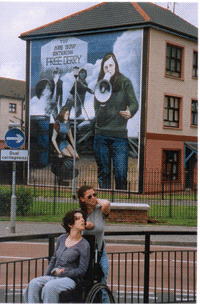Irish Literature in Dublin
Disability Does Not Prevent Study Abroad
By Johana Schwartz
 As a student of the works of James Joyce, I had wanted to visit Ireland for some time. My home university strongly encourages foreign study, so I concluded early in my college career that an academic experience in Ireland was both necessary and possible. Although my university does not sponsor a study abroad program in Ireland, the campus center for international study helpfully referred me to various institutions that do. To satisfy my specific goals, I enrolled in the NYU in Dublin 2001 Summer Study Abroad program, an annual 6-week summer semester at Trinity College in Dublin. As a student of the works of James Joyce, I had wanted to visit Ireland for some time. My home university strongly encourages foreign study, so I concluded early in my college career that an academic experience in Ireland was both necessary and possible. Although my university does not sponsor a study abroad program in Ireland, the campus center for international study helpfully referred me to various institutions that do. To satisfy my specific goals, I enrolled in the NYU in Dublin 2001 Summer Study Abroad program, an annual 6-week summer semester at Trinity College in Dublin.
ADA Assures Civil Rights
As an American program, NYU is subject to the Americans with Disabilities Act, even in another country, and I felt reassured being protected by the same rights as at home. Knowing which civil rights would be guaranteed would free me to focus on my academic commitments.
In New York, NYU worked with me to accommodate my disability-related needs. The Henry and Lucy Moses Center for Students with Disabilities arranged for me to have extended time on examinations and offered to provide a notetaker of my own selection for lectures. The director of the NYU in Dublin program located a comfortable apartment near the Trinity College campus. (The college has wheelchair accessible dormitory rooms on campus, but during my stay they were being remodeled.)
The conflict between the need for comfort and accessibility and esthetics and the desire for historic preservation arose frequently during my stay in Ireland. Much of Trinity College campus is cobblestone. The campaign to install a smooth path for wheelchairs and walkers faces resistance from heritage associations, and the outcome remains uncertain. Beyond the campus, many streets are also paved in cobblestone, and most of the sidewalks are narrow and crowded. Many tourist attractions are located upstairs in older buildings that lack lifts. Some of the oldest attractions on the NYU itinerary were completely inaccessible to me. However, the program leaders warned me about these barriers and consulted with me to plan an alternative activity. (Students with disabilities should familiarize themselves with a country’s legal code regarding disability and access prior to traveling.)
Accessibility in Dublin
Through Internet research I discovered that Ireland has organized many services and resources for the disabled. One of the most helpful public organizations is the Irish Wheelchair Association. In addition to wheelchair repair and rental, the IWA provides accessible transportation within Dublin and caters to the clients’ specific needs. A service called Vantastic allows clients to reserve a wheelchair accessible minibus and driver. It is free to Irish citizens and is available to foreigners for a reasonable fee. Minibus taxis with wheelchair access are commonly available on Dublin city streets, but, unlike Vantastic, they cannot be reserved ahead. A number of public buses in Dublin are equipped with lifts and wheelchair tie-downs, but routes and frequency are unpredictable. Trains are generally more accessible than buses.
Anyone may use the IWA’s list of care providers to hire privately, and it was easy for me to locate an appropriate caregiver. Students affiliated with Trinity College, whether enrolled directly during the school year or through a program, as I was, may consult Trinity’s disability liaison officer for a roster of graduate students interested in working as academic and personal care assistants. Trinity College students, including eligible foreigners, receive a stipend from the university to hire attendants for the number of hours they require help. Americans who study abroad and receive IHSS funding may have the additional option of bringing along an attendant from home or recruiting an American abroad, depending on local policies. I had the combined help of an IHSS funded aide and an IWA aide who I pa id privately, thereby smoothly meeting my extensive need for attendant care.
I was impressed by Ireland’s wealth of programs that support disabled people and the attitude of the Irish people toward disability — they are hospitable and open-minded. The combination of the public agencies, the sentiment of the Irish people, and the flexibility of the NYU Summer in Dublin faculty made my first overseas experience successful and rewarding.
JOHANA SCHWARTZ, a junior at Stanford Univ. earning her BA degree in a self-designed interdisciplinary major in Irish studies, has cerebral palsy and uses a wheelchair for mobility and a Liberator to write and communicate.
|
